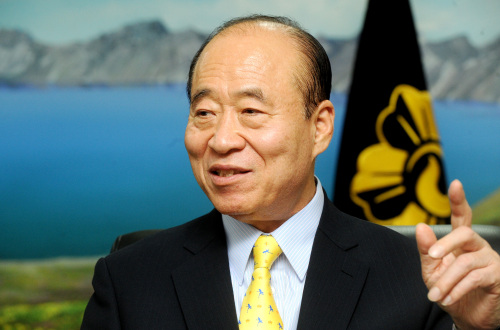Advisory body vice chief calls for preparations for North Korea’s hard landing
The reunification of the two Koreas has an absolute, significant value that must not be undermined by rash discussions over insignificant details, according to vice chief of Seoul’s presidential advisory body on reunification.
The ways and forms of reunification, such as “how much it would cost us to reunite with it can be discussed later on,” Kim Hyun-uk, executive vice president of the National Advisory Council for Democratic Peaceful Unification, said in an interview with The Korea Herald.
“What is more important is to form a national consensus over the essentiality of unification. This is one of our council’s main duties,” he said.
The reunification of the two Koreas has an absolute, significant value that must not be undermined by rash discussions over insignificant details, according to vice chief of Seoul’s presidential advisory body on reunification.
The ways and forms of reunification, such as “how much it would cost us to reunite with it can be discussed later on,” Kim Hyun-uk, executive vice president of the National Advisory Council for Democratic Peaceful Unification, said in an interview with The Korea Herald.
“What is more important is to form a national consensus over the essentiality of unification. This is one of our council’s main duties,” he said.

Established in 1981 with the nation’s president as chief of the body, the advisory council currently has more than 20,000 members at home and abroad.
Some of the roles of the council are to examine and suggest North Korean policies to the government, conduct surveys related to unification policies, and hold international seminars to keep overseas Koreans alert on the necessity of reunification.
“Koreans are very smart, dynamic people. We are sure to grow into the largest economy in northeast Asia once we reunify into a country with 75 million people,” Kim said.
Separated since the 1950-53 Korean War ended in a truce, the two Koreas are technically still at war with one another and have exchanged fire near their tense sea border as recently as November.
The two Koreas, however, have walked two very different paths during the past six decades with the South growing into Asia’s fourth-largest economy while the North has become one of the world’s poorest countries.
“North Korea is not hurting anyone but itself” with its ongoing nuclear ambitions, said Kim. “Nuclear weapons can only be a threat when they are not used. It must ponder on our economic developments and its own situation to make the right decision.”
The younger generation here, which did not suffer the deadly war, has become somewhat skeptical about reunifying with the impoverished Pyongyang, disliking the idea of Seoul having to shoulder most of the expenses.
“We must be fully prepared,” Kim said, noting the sudden collapse of East Germany.
“A country can end suddenly and unification can happen in the most unimagined form,” he said. “We must also be prepared for North Korea having a hard landing.”
Kim, a right wing politician who served four terms in the National Assembly, took a cautious stance on resuming food aid to North Korea, while supporting enactment of the North Korean human rights law.
“Humanitarian aid, especially medicine and other necessities for children, must continue. But rice is a different issue,” he said. “Many scholars agree that rice ends up going to the military, not the general public. Transparency is an important issue here.”
Kim called enactment of North Korean human rights law a “humanitarian gesture.”
“The law is not something aimed at striking the North. It is only natural for us to voice out for the peace and well-beings of North Koreans,” he said. “We have more than 20,000 North Korean defectors living among us now. Isn’t it the least we can do to show them we care for the well-being of their families and friends?
South Korea’s right wing Lee Myung-bak administration and the ruling party have been pushing a bill calling for improvement in the North’s dire human rights situation. The bill has been pending at a parliamentary subcommittee since February last year due to objections from the progressive main opposition party, which claims the move will provoke the North and sever ties.
The iron-fisted North Korean regime often reacts sensitively toward outsiders’ attempt to bring to light its suppression of people.
Kim will be visiting the U.S. from Sunday to appoint new advisors in the council’s overseas branches, and plans to meet with experts and officials there, including the U.N. Secretary-General Ban Ki-moon, to discuss reunification policies, he said.
The council has more than 3,700 advisors working at some 105 overseas branches.
“I believe we have to work on unification like a prayer,” said the 72-year-old official. “A prayer with modesty will move the universe to do something that cannot be done with human capacity.”
By Shin Hae-in (hayney@heraldcorp.com)









![[Hello India] Hyundai Motor vows to boost 'clean mobility' in India](http://res.heraldm.com/phpwas/restmb_idxmake.php?idx=644&simg=/content/image/2024/04/25/20240425050672_0.jpg&u=)








